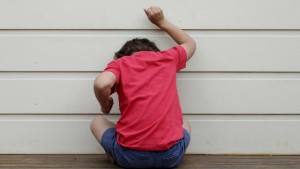THERE’S been a significant increase in children diagnosed with Autism Spectrum Disorder (ASD) attending mainstream Australian schools over the last decade, presenting some unique challenges for families, schools and the wider community.
Are our teachers coping? Are the other kids in the classroom detrimentally affected? And are the expectations of parents with ASD children realistic? News.com.au asked the experts, a teacher and a parent with a child on the spectrum for their thoughts on the topic and their widely varying responses surprised us.
First published at www.news.com.au on Sunday, August 28 2016.
Autism Spectrum Disorder (ASD) is an umbrella term used to describe a range of lifelong neurodevelopmental conditions. It’s difficult to generalise the characteristics of ASD as they can vary so dramatically from person to person but the hallmarks are communication difficulties, sensory sensitivities and social and emotional development issues.
Teachers are expected to assimilate high-functioning and often highly intelligent ASD children with the rest of the class and meet the specific needs each ASD child requires to facilitate their learning and development requirements.
Victorian primary school teacher Justine Neale* is currently teaching a foundation class of 30 students — three of those kids are on the spectrum. Neale is a dedicated, experienced senior teacher and for many years has facilitated the needs of ASD students in her classroom but says the pressure she feels this year is particularly acute.
“As a teacher I’m close to being burnt out and losing the love that I have for teaching,” she says. “By the end of the school day I’m always exhausted.
“In order to teach in a calm and productive manner, I need to be super organised because I can’t leave anything to chance. I spend a lot of my time doing extra planning for the children on the spectrum … at least two hours a week just focusing on their programs.
“I often have people say that they couldn’t teach my class and I don’t know whether to take that as a compliment or an insult.”
Tony Attwood is a clinical psychologist and one of the world’s foremost experts on Asperger’s syndrome and says it takes a certain type of teacher to effectively teach ASD kids and bring out the best in them.
“There are some teachers who get ASD,” he explains. “But then there are also many others who don’t and need an awful lot of training.”
Dr Beth Saggers, autism researcher and educationalist from Queensland University of Technology, agrees. “Teachers are the meat in the sandwich,” she says. “We have an incredible expectation that teachers can do everything.”
GETTING SOCIAL WITH AUTISM
Attwood advocates mainstream education for some high-functioning ASD kids for social inclusion and also as an essential part of their emotional and social development.
“One of the essential components of ASD is a difficulty in socialising, especially with peer groups and making friends,” Attwood explains. “So it is particularly useful to have appropriate role models as potential friends in an ordinary school.”
But these socialisation lessons can be particularly harrowing for a child on the spectrum, as NSW mum Sally Willows* has witnessed. Her 11-year-old son Edward* was diagnosed with ASD four years ago and experiences disabling sensory issues and also suffers from Generalised Anxiety Disorder.
Willows has watched him struggle to make friends and find acceptance in a mainstream school.
“Edward hates being different. He tries really hard to do everything the other kids do — he just wants to fit in,” she says. “But last week he came home and said, ‘Mum everyone thinks I’m weird’ and I said, ‘That’s not true’, but he said, ‘No it is, Mum. Everyone in my whole class thinks I’m weird’.
“I see children just sneering at him, you know, and I feel like shaking them and saying, ‘He can’t change, he can’t help who he is! He thinks you’re weird but he’s not trying to change who you are so why can’t you just try and accept him.’
BULLYING IN THE PLAYGROUND
Willows says Edward has had his share of bullying over the years. “Yes, he periodically gets bullied,” she says. “ASD children are many times more likely to be bullied than neuro-typical children and it’s usually not physical, it’s about exclusion.”
Attwood believes bullying is one of the biggest challenges for ASD kids in a mainstream school. “On the one hand we want to try and get them integrated and making friends and enjoying a social life but the chances are they’re not going to meet the nice guy, they’re going to meet the predator,” he says.
“Kids can be incredibly mean, not realising the terrible damage they’re doing to the ASD child,” he says.
He says he treats a lot of the teenage and adult ASD patients for depression as a result of bullying and teasing during their formative years at school. “Depression affects one in three ASD adults, which is significant leap from the one in six in the general population,” he says.
This month Attwood is releasing a new book on the issue, Exploring Depression, and Beating the Blues. “As a psychologist, I pick up the consequences when they’re suicidal, and that’s serious,” he says. “Sometimes I have to do a bit of archeology and the issue of self-esteem is often based on the rejection and criticisms of peers, non-inclusion and confidence.
“School is setting them up for a successful life. [So by not sending ASD kids to mainstream schools] success is sometimes what you prevent — and you’re preventing the depression, which means they have a greater degree of energy and involvement in life rather than long-term psychological support needs.”
PARENTAL EXPECTATIONS
Willows says Edward has had a mixed bag of teacher experiences over the years. “This is now Ed’s seventh year of schooling and in that time he’s had two excellent teachers, a couple of average ones and three really bad ones,” she says.
“ASD kids need to be treated as individuals and there are adjustments that have to be made for the children in the classroom, which is especially important if the teacher isn’t a particularly good teacher. Their inability to facilitate or cope can cause significant damage to ASD students. It has for Edward.”
Attwood says one of the biggest dilemmas teachers face is an equitable distribution of their time and engagement. “Those kids with ASD need more engagement and take up more of their time, which can make teachers and other parents feel they’re neglecting the other kids,” he says.
Neale agrees, describing the balancing act she performs every day to manage myriad behavioural issues of ASD children with the academic progress of the class.
“I’m always teaching by keeping an eye on the children with autism in order to quickly diffuse a situation before it interrupts the rest of the class too much,” she says.
“All the children are quite accepting now and I praise them for their help and patience if I need to handle a situation. But sometimes I do worry that they may see some of the ASD kids’ behaviours as acceptable behaviour.”
Neale says she also has to contend with managing parental expectations and that while some parents are understanding of the additional pressures of teaching their ASD child alongside the rest of the class, others are particularly difficult and harbour “unrealistic expectations of mainstream schools”.
As a parent, Willows understands the importance of going into bat for her ASD child. “It’s a bit of a double disability with high-functioning ASD because some teachers don’t believe there’s a problem at all. They believe I’m the problem, that I’m an overprotective mother,” she says.
“But you have to lobby when you’re a parent of a special-needs child in mainstream schooling because you learn very quickly that unless you do they just won’t get what they need and they’ll slip through the cracks.”
DOES MAINSTREAM SCHOOLING WORK FOR ASD KIDS?
Australian author, educator and ASD specialist Sue Larkey has no doubt mainstream schools are an ideal place for ASD kids. “It’s a fantastic environment for kids on the spectrum. It takes a community to raise a child with ASD and I see amazing school communities all the time,” she says.
Attwood remains positive as well. “Autism is part of life,” he says. “Schools in the local area are for local kids so there’s no reason to exclude ASD kids from an ordinary school unless there are very distinct reasons.”
But Neale says she has her doubts. “I’ve heard teachers and teacher aides say, ‘If I wanted to work in a special school I would have trained to do so’. But for me, I see both sides,” she says. “I love teaching autistic kids but it takes its toll, I think. At present, I don’t believe it’s working.”
Willows also says she isn’t so sure. “You don’t have any less expectations of your children — you know how wonderful and gifted they are,” she says. “But Edward’s not achieving to his potential because of the schooling environment and I’d like him to get close to that. But also to get through school unscathed and I’m not at all sure that’s going to happen.”
*Names changed at request of interviewees.
News Limited Copyright © 2016

